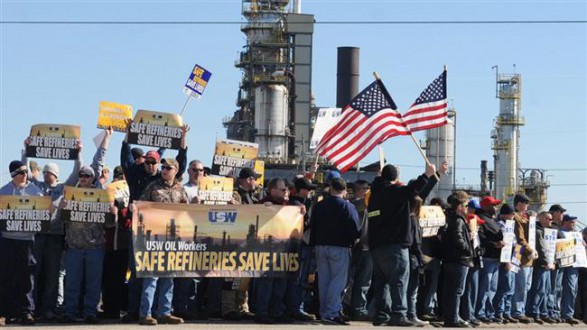
It appears that, as the United Steelworkers’ partial-nationwide strike now enters its fifth week, union members who average $80,000 to $100,000 per year (with overtime) are beginning to feel a pinch in their pocketbooks.
With only a dozen or so refineries currently out on strike, according to the Chicago Tribune, members of the union’s national bargaining committee have been asked why the union has not called all of the union’s 65 refineries out on strike.
According to Jim Savage, president of USW local 10-1 in Pennsylvania, the union decided to strike some–but not all–refineries as part of a larger strategy.
Savage said one of the main questions he’s asked by USW members is why the national bargaining team didn’t call for members at all 65 refineries and more than 200 production facilities in the U.S. to go out on strike at once.
He said the reason was two-fold: to keep the government from interfering with this labor dispute and to retain some bargaining power if negotiations don’t progress.
“If we fire all our bullets out of our gun on day one, what do we say later? If you don’t come to the table, we’ll do what,” Savage said.
Savage’s comments about keeping the government out of the strike is based on President Obama’s ability, under the Taft-Hartley Act, to order workers back to work for a “cooling off” period if, in the President’s opinion, the strike is having a detrimental impact on the economy.
Whether or not the strike escalates to that level remains to be seen.
The parties are reportedly returning to negotiations on March 4.
Gas prices nationwide, according to Gasbuddy.com, are up an average $0.39 per gallon since the strike began.






